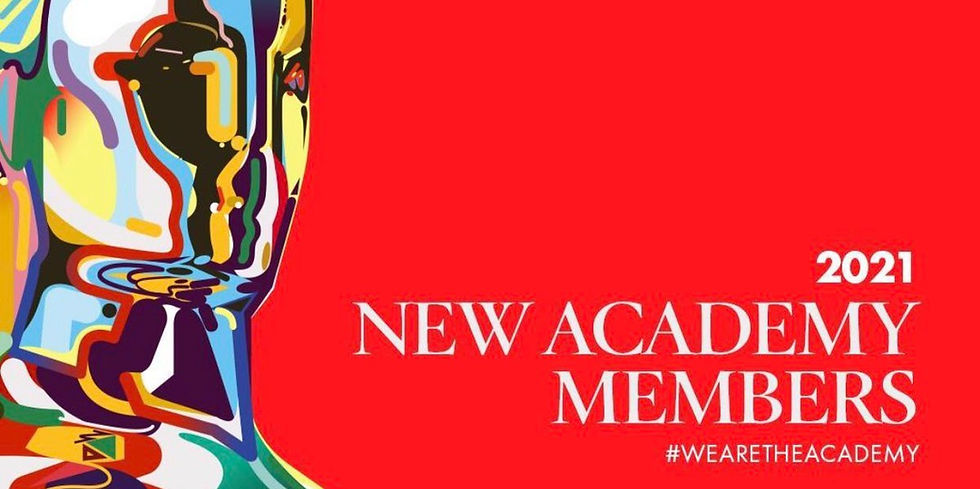Column - What the Oscars 2021 taught us about the current state of the short film industry:
- Shortrade

- 30 avr. 2021
- 4 min de lecture
More than ever the stakes were high for these Oscars 2021. The sanitary context obviously changed everything, from the venues to the social distances between the nominees themselves. But one thing that remained unchanged is that almost everybody kept an eye on the list of wins by studio during each category announcement. Results of the game: Netflix arriving first with 7seven awards, ahead of Disney that managed to win five of them (including three under the Searchlight Pictures banner). A difference of only two Oscars that could be summed-up in three words, « short film categories ».

The streaming giant indeed won both Live Action and Animated Short Films, with respectively "Two Distant Strangers" by the duo Travon Free/Martin Desmond Roe, and "If Anything Happens I Love You" by Michael Govier and Will McCormack. Whereas the third short film category (Best Documentary Short Subject) has been picked by "Colette", directed by Anthony Giacchino and coproduced by Facebook’s Oculus Studios.
Yet these two acquisitions by Netflix (and not productions, as Facebook with "Colette") tell us how aware the platform is of the key themes that Academy voters especially care about. Indeed, even though the artistic qualities of "Two Distant Strangers" and "If Anything Happens I Love You" are absolutely unquestionable, each of these stories are dealing with the very hot topics of police brutalities against black minorities, and mass shootings in America. Topics that were certainly crucial in the voters’ mind to make a difference with the rest of the nominated films, and Netflix couldn’t occult this.
More generally, a majority of nominated shorts were already focusing on themes that we know the Academy really cares about. Many of these stories were dealing with barriers for example. Barriers under their physical form, as in "The Present" where a father and his daughter are living so close to the Palestinian border that they have difficulties to bring a new fridge across the controls, but also the fences of "The Letter Room" which stars Oscar Isaac as a policeman whose new task is to go through the letters received by the convicts. Or also the French-German border that Colette finally goes through in the eponymous short documentary. Even the barriers of difference as depicted in "Feeling Through", which tells the encounter between a teen-in-need and a Deafblind man.
Without surprise, these relevant themes for the voters were very clearly underlined in the campaign strategies and marketing elements of many nominated shorts. We can take the example of "Feeling Through", whose visuals insisted on its specificity of being « the first film to star a Deafblind actor », or some marketing elements of Elvira Lind’s "The Letter Room", pointing out that « no female director has won this Oscar in nearly 20 years ».
This relevance of stories and themes in 2021 has been even more crucial than usual due to the increasing level of professionalism from the short film campaigners. Because of the pandemic, the traditional strategies have been completely renewed and adapted to digital. Meaning that a new kind of publicists, specialized in this field, came to join a list of established Oscar strategists that already became bigger and bigger each year. That’s why each nominated short in either one the three categories put every effort in their online marketing: websites, social media, behind the scenes, live Q&As and others. This practice of Q&As has especially been used, helped by the development of such tools as Zoom but also by the sudden availability of talents who became suddenly free from touring and shooting obligations.
Moreover, the sanitary context almost led to a crossroad situation between short and feature films. As shown by the ceremony’s historically low TV ratings, people were mostly disconnected from a majority of the nominated feature films. The reason being that they didn’t really have the opportunity to see them in movie theaters. At the same time, short films benefited from a new appetite from people worldwide for online contents. Which is why the visibility lost by the feature film industry benefited, on the contrary, to short films.
But if these shorts are becoming more and more accessible to everyone, their broadcasters are at least as diverse, if not even more, than the feature film nominees. When some of the nominated short films are still accessible for free on YouTube ("Feeling Through") or Vimeo ("Genius Loci", "Yes-People", "Do Not Split"), some can be watched through ShortsTV ("White Eye", "Opera") or Netflix ("The Present", "Two Distant Strangers", "If Anything Happens I Love You", "A Love Song for Latasha"). The only one available only on Disney+, "Burrow", doesn’t come as a surprise since the animated short comes from Pixar.
A diversity that leads to one of the most interesting conclusions of these 93rd Academy Awards: the new streaming giants may be ready to spend millions to « buy » some of the biggest names of the industry, but are not keen to spend even more time to search and be selective enough about tomorrow’s new creative talents. At least not yet.
P.-Y. B.








Commentaires